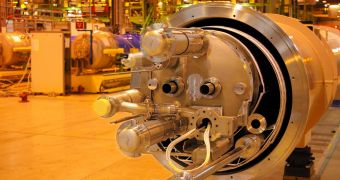Scientists from CERN stated on Saturday that the Large Hadron Collider may be shut down for at least 2 months, following the leak of a large quantity of helium – used in order to cool one of the proton-guiding magnets – into the collider tunnel. This is the last and the worst out of a series of unfortunate events that cast worrisome shadows on the results of the experiment.
It's only been 11 days since the researchers cheerfully delved into the biggest, most expensive international effort that is LHC, the huge device under the Swiss-French border, which is expected to discover things that would (re)shape modern physics, as well as the way we understand the universe. After the success of the first tests, they were anxious to move on to obtaining low-energy collisions at 450 billion electron volts and then at 5 trillion electron volts during the experiment from October 21st. Still, a series of mishaps seems to give the experts relentless trouble. The last one of them may even delay the start of the actual experiment, set for October 21st, for 2 months. As the people from the laboratory explained, because of the high current used, an electrical connection between the machine's magnets had melted, although safety regulations ensured that the malfunction had posed no threat for people.
The main problem of the repairing team is not dealing with the meltdown that occurred on Friday, but the fact that the LHC operates at near-absolute zero temperatures (below 2 degrees Kelvin, about -271 degrees Celsius or -456.25 degrees Fahrenheit), which is even colder than in the outer space. People can't even survive at temperatures much higher than this. Therefore, the respective area of the machine has to be warmed up to a temperature where the repair guys can do their job normally, after which it has to be chilled again. Both processes take about a month; add in the repair time and voilà – more than 2 months of postponement. Also throw into the equation the fact that CERN's laboratory closes during the winter anyway, in order to save money for electricity and 2009's first month begins to look more promising as an experiment date than late 2008.
An e-mail from Dr. James Gillies, CERN's chief of communications, claims that "This is just an unfortunate fact of life when starting up a machine like the L.H.C.," adding that similar devices (though lower in size and purpose), such as Fermilab's or the one at Brookhaven National Laboratory in New York, experimented similar difficulties before starting up. "Once they settled in they seem to be pretty stable," Gillies assured us.
"This was the last circuit of the LHC to be tested at high current before operations," said Gillies. "There are an awful lot of these connections between wires in the machine. They all have to be very well done so that they don't stop superconducting, and what appears to have happened is that this connection stopped being superconducting. By Monday I suspect we'll know more," he concluded. There are hopes among the people from the laboratory that particle collisions may still happen at LHC this year, although the most reasonable expectations would place them at the beginning of next year.

 14 DAY TRIAL //
14 DAY TRIAL //